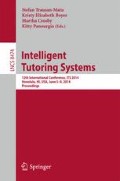Abstract
We present in this paper the findings of a study on the role of macro-adaptation in conversational intelligent tutoring. Macro-adaptivity refers to a system’s capability to select appropriate instructional tasks for the learner to work on. Micro-adaptivity refers to a system’s capability to adapt its scaffolding while the learner is working on a particular task. We compared an intelligent tutoring system that offers both macro- and micro-adaptivity (fully-adaptive) with an intelligent tutoring system that offers only micro-adaptivity. Experimental data analysis revealed that learning gains were significantly higher for students randomly assigned to the fully-adaptive intelligent tutor condition compared to the micro-adaptive-only condition.
Access this chapter
Tax calculation will be finalised at checkout
Purchases are for personal use only
Preview
Unable to display preview. Download preview PDF.
References
Alonzo, A.C., Steedle, J.T.: Developing and assessing a force and motion learning progression. Science Education 93, 389–421 (2009)
Brusilovsky, P.L.: A Framework for Intelligent Knowledge Sequencing and Task Sequencing. In: Frasson, C., Gauthier, G., McCalla, G.I. (eds.) ITS 1992. LNCS, vol. 608, pp. 499–506. Springer, Heidelberg (1992)
Dedic, H., Rosenfield, S., Lasry, N.: Are All Wrong FCI Answers Equivalent? In: Proceedings of the Physics Education Research Conference, Portland, Oregon, July 21-22 (2010)
Hestenes, D., Wells, M., Swackhamer, G.: Force concept inventory. Phys. Teach. 30, 141–158 (1992)
Evens, M., Michael, J.: One-on-One Tutoring by Humans and Computers. Lawrence Erlbaum Associates, Inc. (2006)
Graesser, A.C., VanLehn, K., Rose, C.P., Jordan, P., Harter, D.: Intelligent tutoring systems with conversational dialogue. AI Magazine 22(4), 39–41 (2001)
Lehman, B., D’Mello, S.K., Strain, A.C., Gross, M., Dobbins, A., Wallace, P., Millis, K., Graesser, A.C.: Inducing and tracking confusion with contradictions during critical thinking and scientific reasoning. In: Biswas, G., Bull, S., Kay, J., Mitrovic, A. (eds.) AIED 2011. LNCS, vol. 6738, pp. 171–178. Springer, Heidelberg (2011)
Rus, V., D’Mello, S., Hu, X., Graesser, A.C.: Recent Advances in Conversational Intelligent Tutoring Systems. AI Magazine 34(3), 42–54 (2013)
Sabo, K.E., Atkinson, R.K., Barrus, A.L., Joseph, S.S., Perez, R.S.: Searching for the two sigma advantage: Evaluating algebra intelligent tutors. Computers in Human Behavior 29(4), 1833–1840 (2013)
VanLehn, K.: The Behavior of Tutoring Systems. International Journal of Artificial Intelligence in Education 16, 227–265 (2006)
VanLehn, K., Lynch, C., Schulze, K., Shapiro, J.A., Shelby, R., Taylor, L., Treacy, D., Weinstein, A., Wintersgill, M.: The Andes Physics Tutoring System: Lessons Learned. International Journal of Artificial Intelligence and Education 15(3) (2005)
VanLehn, K., Jordan, P., Litman, D.: Developing pedagogically effective tutorial dialogue tactics: Experiments and a testbed. In: Proceedings of SLaTE Workshop on Speech and Language Technology in Education (ISCA Tutorial and Research Workshop) (2007)
VanLehn, K.: The Relative Effectiveness of Human Tutoring, Intelligent Tutoring Systems, and Other Tutoring Systems. Educational Psychologist 46(4), 197–221 (2011)
Wang, J., Bao, L.: Analyzing Force Concept Inventory with Item Response Theory. Am. J. Phys. 78(10), 1064–1070 (2010)
Author information
Authors and Affiliations
Editor information
Editors and Affiliations
Rights and permissions
Copyright information
© 2014 Springer International Publishing Switzerland
About this paper
Cite this paper
Rus, V., Stefanescu, D., Baggett, W., Niraula, N., Franceschetti, D., Graesser, A.C. (2014). Macro-adaptation in Conversational Intelligent Tutoring Matters. In: Trausan-Matu, S., Boyer, K.E., Crosby, M., Panourgia, K. (eds) Intelligent Tutoring Systems. ITS 2014. Lecture Notes in Computer Science, vol 8474. Springer, Cham. https://doi.org/10.1007/978-3-319-07221-0_29
Download citation
DOI: https://doi.org/10.1007/978-3-319-07221-0_29
Publisher Name: Springer, Cham
Print ISBN: 978-3-319-07220-3
Online ISBN: 978-3-319-07221-0
eBook Packages: Computer ScienceComputer Science (R0)

